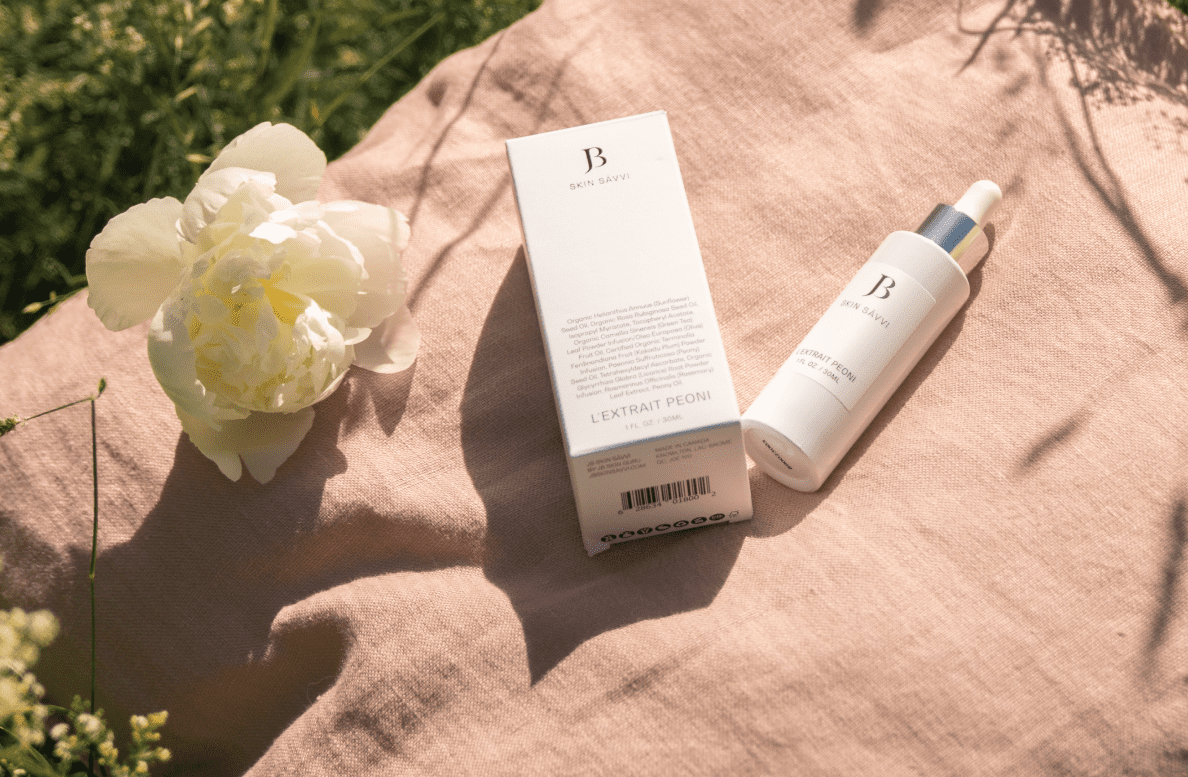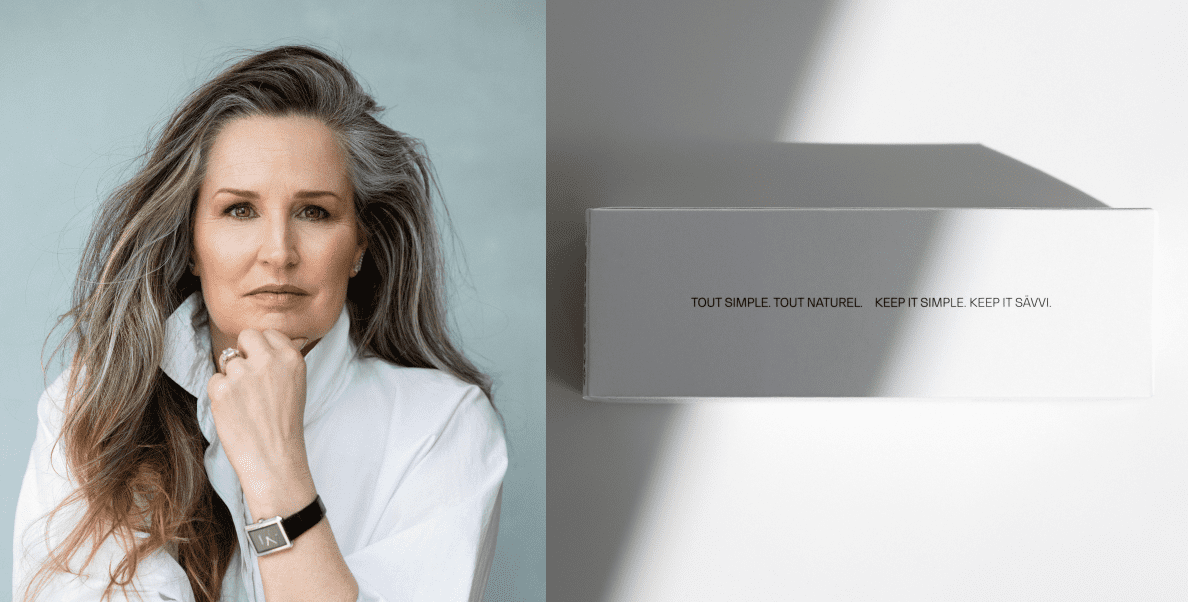There are days when Jennifer Brodeur wished she didn’t care so much.
In a way, it would be easier for the owner and founder of JB Skin Sävvi. There would be fewer problems to solve. Logistics would be a snap. And customers, well, they would ask far fewer questions.
The only problem is, Jennifer Brodeur does care – quite a bit, actually – about the impact of her business, the legacy of her brand and the fate of the planet. She cares so much, in fact, that she subjected her brand to the most strenuous certifications possible.
It’s a move, she hopes, that makes her brand’s intentions quite clear.
“At the end of the day, let’s not kid ourselves, I just sell face cream. So, it could be much simpler than I make it. But for me, I want to contribute something. I want something that’s going to be good for your skin, something that’s going to be good for the planet. I want to be able to know, when I’m 90 or 100 years old, that maybe what I did had a small, positive impact on the world.”

Finding a new way
It’s OK if you love good packaging – she does, too.
“I am a weird contradiction,” Brodeur laughed. “There is a side of me that loves packaging. I do. I love the whole emotional thing. Remember how it felt when you bought an iMac back in the day? The boxes. The smell. The feel. The whole thing. I just loved it. But in today’s world, you can’t think that way.”
Starting in 2003 when she created her first device, Max+ light therapy, Brodeur has stood against throwaways. It is a less-is-more approach she still carries today. She wants to create things that have longevity, that are used and used again.
“I’ve always been that person who when I bought something, I bought it because it was going to last me a long time. I’m that person who will wear a coat that’s 20 years old because I chose it to last.”
So, when it came to creating her natural ingredient skin care brand, Brodeur applied a less-is-more mindset from end to end – from ingredients to bottles to boxes to end of life. Every aspect needed to be looked at. Over time, that led to a number of sustainable innovations for JB Skin Sävvi (pronounced “savvy”), including:
- Elimination of all unnecessary packaging by reducing the number of boxes and cardboard included in shipments. For instance, the brand no longer produces boxes for cleanser and toners.
- Remaining boxed products are packaged in carbon-neutral and FSC-certified boxes.
- 100% recyclable product bottles produced by a company with IIP Gold certification and Gold EcoVadis sustainability rating.
- Serum droppers manufactured by a company which works with 100% renewable energy.
- Carbon-neutral shipping via Canada Post.
While proud of each accomplishment, Brodeur knew she could enhance her operations further.
“I feel like we’re in an era where a lot of people say the right things,” she said. “So, how could we make sure that what we’re saying is true? The only way we could be 100% accountable is by being audited because without an audit, you miss things. It’s normal. We all miss things. But we wanted to know.”
Scale your business sustainably with our ecommerce experts.
Let’s chatDiving deep into certification
It was time to make a bold statement – one that spoke clearly and objectively about the brand. For Brodeur, that meant putting JB Skin Sävvi through two of the toughest certifications in the industry: COSMOS and B Corps.
“We’re in an era where everyone is greenwashing everything,” she said. “If I go into a store who wants to sell our brand and they ask, ‘What makes you different?’ I can tell a lot of stories about what makes us different. But even then, it’s normal that they’re suspicious.”
“So, I thought, if we were audited and do the certification, then I don’t have to say anything. That label, that logo on my product speaks for itself. It just cuts through all that red tape and shenanigans.”
COSMOS (COSMetic Organic and Natural Standard) sets certification requirements for organic and natural cosmetics products. Recognized globally by the industry, the standard requires businesses to adhere to specific guidelines in order to receive its consumer-respected signature on products.
Nearly 2,000 manufacturers selling more than 34,000 products across 78 countries follow the COSMOS standard.
JB Skin Sävvi hold COSMOS Ecocert Certification on its popular Peoni collection. That means the company embraced environmentally friendly production and processing processes that respect human health; responsible use of natural resources; respect of biodiversity; absence of GMO; and recyclable packaging.
Beneficial Corporations certification – or B Corp, for short – are businesses that act in ways that benefit society as a whole. What defines them is their belief that the purpose of a company is not just profits, but also social and environmental good.
B Corp certification is a designation based on a rigorous assessment that indicates a business meets the highest standards in 3 areas: social and environmental performance; public transparency; and legal accountability. Since 2016, more than 6,200 companies in 87 countries and 159 industries received B Corp certification.

“We took a deep dive into these certifications,” explained Brodeur, who highlighted the 360-nature of B Corp as a real game-changer for the company.
“We reviewed all of our pillars. That was important to us. I felt like the human resources side needed also to be sustainable. I know that sounds really corny. But oftentimes, if business is going well, and we’re working hard and doing all the things we need to do, we can forget to check in on our people. Are they taking time off? Are they working all hours of the day? It made us regroup and review our procedures, most of them were on point, but we did modify a few things.”
The certifications sparked even more change for the company, including moving its lab from Vancouver to Montreal to ensure its work was done within a 200-kilometer perimeter and tweaking a few product formulas.
“From A to Z, we literally reviewed everything that we’ve done. It’s a huge risk. Because when you reformulate something that people love, in a way, it’s kind of silly. It is scary,” Brodeur said.
Leveraging certifications for growth
The certifications have proved beneficial to the business as it scales by allowing it to rise above the noise around sustainability.
For example, some stores and larger chains, especially in the United States, have started implementing their own rules around product sustainability – creating a confusing hodgepodge of rules to navigate, often leading to item-by-item debates. These certifications, however, have allowed Brodeur to speak clearly as the brand seeks to grow.
“You can’t comply with everyone. So, for us, we have achieved the highest norm and hit all targets and we’re certified. That opens up the doors for us to expand the business into the U.S. market.”
Certifications have not solved every problem. While they help codify a vision and align operations, there are tremendous challenges still surrounding communication about what those certifications mean.
Customers, for instance, are not fully there yet. They still expect everything from brands.
“Most consumers want everything – beautiful packaging, ribbons, fragrance, all the bells and whistles. They want it all and to be told it’s sustainable,” Brodeur said. “So, the minute you tell them this way isn’t sustainable because if I keep adding packaging to your package that I’m shipping, it makes no sense.”
A great example is the brand’s toiletry bag, composed of recycled bottles and tires.
“It’s so unsexy to say,” she laughed, “but it’s a beautiful bag. It’s lovely. Even at an event, we don’t use shopping bags, we put everything in the toiletry bag. But for some people, that’s a huge turn off. They want the shopping bag, the tissue paper, they want the experience. So, it’s a process.”
In Canada, there is still a need to educate on sustainability. The brand uses every outlet they can, from podcasts and articles to videos on how to recycle your bottles, clips on TikTok and direct calls and emails from customers.
“We’ve come a long way in Canada. When we started this, a lot of people – a lot – told me that no one cares, that it was just for me. They told me I was nuts. Even internally, my team told me nobody would care,” Brodeur said. “So, I surveyed all of our existing clients, asking if COSMOS or B Corp certification would make a difference. 86% said they would choose a B Corp-certified company over another skin care brand. I was taken aback.”
While certifications have aided JB Skin Sävvi in its growth, Brodeur knows all brands are not as lucky.
“At the end of the day, there’s a good and a bad to it. Because it’s so time-consuming and costly, sadly, there are going to be some amazing brands out there that won’t be able to do it. I worry about that because they deserve to shine.”
In the end, however, Brodeur stresses the shift isn’t about one business or one industry, but a larger change in mindset.
“This is a culture shift for everyone. It’s going to take time. But we’ll look back in 10 years and think how silly and wasteful our ways were. In the future, a sustainable mindset is just going to be the way it is. Until then, that transition is rough.”
Don't let the inspiration end here
Dive into the full JB Skin Sävvi story in our latest issue of Ecommerce Insider magazine and subscribe to unlock your download.
Subscribe